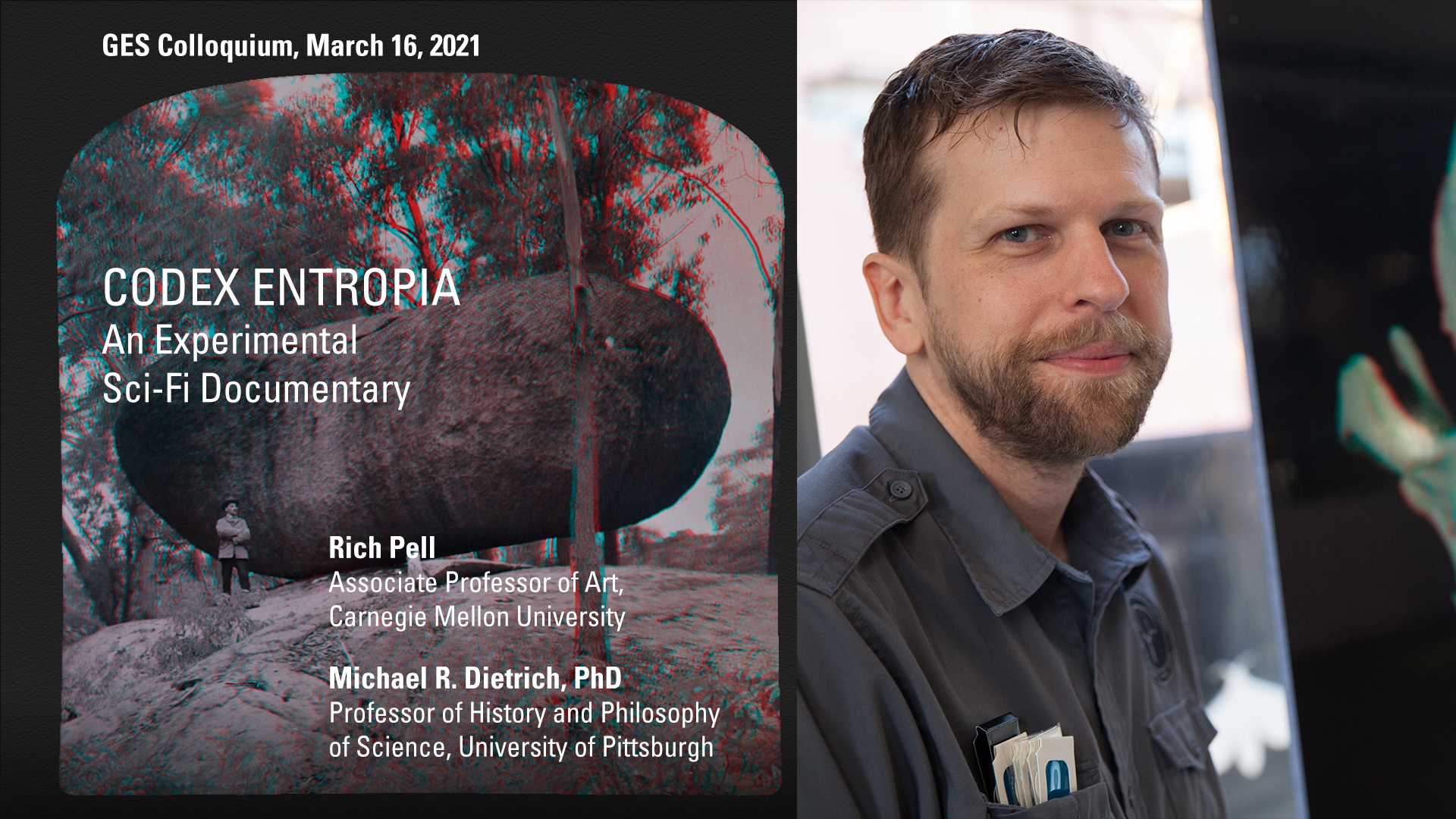
- This event has passed.
Rich Pell – CODEX ENTROPIA: An Experimental Sci-Fi Documentary | GES Colloquium (Zoom)

GES Colloquium Home | Zoom Registration | GES MediaSite | Video Archives | Podcast | @GESCenterNCSU | Newsletter
CODEX ENTROPIA: An Experimental Sci-Fi Documentary
Co-Sponsored by the University of Pittsburgh Center for Bioethics
See also: Art’s Work/Genetic Futures 2.0
Speakers: Rich Pell, Associate Professor of Art, Carnegie Mellon University
Website | Twitter @postnatural
Michael Dietrich, Professor of History and Philosophy of Science, University of Pittsburgh
Screening the 3D anaglyph version of the 9 minute film CODEX ENTROPIA and discussing its implications and creation. (*3D glasses available in Hunt Library, on table across from elevator, or purchase on Amazon for $5)
Abstract
This event premiers Richard Pell’s CODEX ENTROPIA, a dystopian epic in the form of a 3D informational film. Using archival stereoscopic images that document the work of Western Pennsylvania laborers, the film narrates an alternative history that speaks to the entanglement of biological life forms, computational data, and political ideology. The film screening will be accompanied by Q&A with the artist and a brief response from historian and philosopher of science Michael Dietrich.
CODEX ENTROPIA is a short (9 min) 3D Sci-Fi Experimental Documentary. It tells the story of a massive geologic formation that contains the complete library of an ancient civilization who developed computing technologies using only well-trained animals. Told through a psychedelic found-footage slideshow, with soundtrack by Jason Martin. Produced entirely from historic stereoscopic photographs, the film will be presented in anaglyph (red/green) 3D, so please make sure you get the glasses to view it from the exhibitions host. A discussion with the film maker and researchers from the Center for Genetic Engineering and Society will follow.
Related:
- CODEX ENTROPIA exhibit
- Message to the People of the Future, Rich Pell
- *3D glasses available in Hunt Library, on table across from elevator, or purchase on Amazon for $5
Speaker Bio
Richard Pell’s (@postnatural) earlier experimental documentary, Don’t Call My Crazy On The 4th Of July (2005), examines the curious case of Pittsburgher, Robert Lansberry, whose unusual political protests were a fixture of downtown Pittsburgh for 30 years. The film won the top prize at the Iowa Documentary Film Festival, Best Michigan Director at the Ann Arbor Film Festival, and was an official selection at the Kassel Documentary Film Festival.
Pell is the founder and director of the Center for PostNatural History, an organization dedicated to the collection and exposition of life-forms that have been intentionally and heritably altered through domestication, selective breeding, tissue culture, or genetic engineering. The Center for PostNatural History operates a permanent museum in Pittsburgh, Pennsylvania, and produces traveling exhibitions that have appeared in science and art museums throughout Europe and the United States. Pell is a National Academy of Science KAVLI Fellow and was awarded the 2016 Pittsburgh Artist of the Year. He is currently an Associate Professor of Art at Carnegie Mellon University.
WordPress database error: [Unknown column 'wp_tec_occurrences.start_date' in 'SELECT']SELECT SQL_CALC_FOUND_ROWS wp_posts.*, CAST( wp_tec_occurrences.start_date AS DATETIME ) AS event_date
FROM wp_posts LEFT JOIN wp_term_relationships ON (wp_posts.ID = wp_term_relationships.object_id) LEFT JOIN wp_postmeta ON ( wp_posts.ID = wp_postmeta.post_id AND wp_postmeta.meta_key = '_EventHideFromUpcoming' ) LEFT JOIN wp_postmeta AS mt1 ON ( wp_posts.ID = mt1.post_id )
WHERE 1=1 AND wp_posts.ID NOT IN (15858) AND (
wp_term_relationships.term_taxonomy_id IN (149,521,802)
OR
wp_term_relationships.term_taxonomy_id IN (45,47)
) AND (
wp_postmeta.post_id IS NULL
AND
( mt1.meta_key = '_EventStartDate' AND CAST(mt1.meta_value AS DATETIME) >= '2026-02-26 08:56:29' )
) AND wp_posts.post_type IN ('post', 'page', 'attachment', 'tribe_venue', 'tribe_events', 'tribe_event_series') AND ((wp_posts.post_status = 'publish'))
GROUP BY wp_tec_occurrences.occurrence_id
ORDER BY event_date ASC, wp_posts.post_date ASC
LIMIT 0, 3